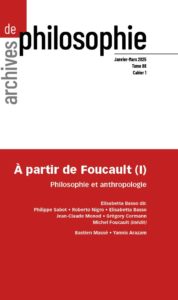 Tome 88, issue 1, January-March 2025
Tome 88, issue 1, January-March 2025
Drawing on Foucault (I). Philosophy and anthropology
 Elisabetta Basso, Foreword
Elisabetta Basso, Foreword
Philippe Sabot, The world without humans? Uses and ambiguities of phenomenology in Michel Foucault’s work
The manuscript dedicated to Phénoménologie et psychologie (Phenomenology and Psychology) appears to relegate the anthropological question to the background, favoring another line of inquiry, ontological in nature, focused on the “world.” We demonstrate that this choice sheds new light on the tension that, according to Foucault, permeates post-Husserlian phenomenology and accounts for its particular place within the field of contemporary philosophy. By highlighting, particularly through Merleau-Ponty, the ambiguities inherent to the phenomenological project, Foucault emphasizes how it represents the “point of heresy” in contemporary thought, torn between anthropology and formalism..
Roberto Nigro,The stakes of the anthropological question. Foucault in dialogue with Kant, Nietzsche, and Heidegger
This article focuses on Foucault’s reading of Kant’s Anthropology from a Pragmatic Point of View. Through his analysis, Foucault examines the framework of thought that has shaped our culture for the past two centuries. Nietzsche’s philosophy plays a pivotal role in this analysis, as it marks the end of anthropological questioning and, in doing so, pushes philosophy beyond its traditional boundaries. In the early 1960s, French philosophy was deeply influenced by anthropological discourse. Given this historical context, what is the significance and relevance of this anthropological critique today?
Elisabetta Basso, The “true measure of man”: Phenomenology and anthropology in the manuscripts of the young Foucault
The paper investigates how Foucault engages with Husserl’s transcendental phenomenology in his manuscripts from the 1950s. Foucault criticizes transcendental phenomenology for having excluded from philosophical thought the deviations from the norms of shared experience. The problem of the relationship between the normal and the pathological point to psychology and anthropology as necessary pathways within phenomenology to measure what is distinct about humanity. However, these disciplines are not without their problems, since they presuppose an essence in humanity.
Jean-Claude Monod, The young Foucault, Blumenberg, and the anthropological-phenomenological knot
In the 1950s, two contemporaries, Michel Foucault and Hans Blumenberg, shared a phenomenological training and an inquiry into the relationship between phenomenology and anthropology, which led them to highlight certain limitations of “pure” phenomenology. But while Foucault took a radical turn toward genealogy and referred to Nietzsche as a way out of the anthropological horizon, Blumenberg reinvested the possibility of a phenomenological anthropology. This article explores these starting points and divergences between two thinkers wary of any form of essentialism.
Grégory Cormann, An ethnology of one’s own culture. Foucauldian appropriations of an interdisciplinary project
Upon its publication, Michel Foucault presented Les mots et les choses (The Order of Things) as an ethnology of his own culture, an effective way of marking its uniquness. The purpose of this article is to recontextualize Foucault’s appropriations of this formula within the framework of French thought from the 1940s to the 1980s: Prompted by the works of Mauss and Lévy-Bruhl, the ambition to conduct an ethnology of oneself became a point of convergence and debate in philosophy and the social sciences. By the summer of 1966, this offered Foucault the possibility of deepening his own theses on history and the longue durée.
Michel Foucault, Hostility, anxiety, and magic (unpublished transcription by Elisabetta Basso, reviewed by Henri-Paul Fruchaud)
* * *
Bastien Massé, Florentine merchants and Machiavelli’s The Prince. On fortune in politics
By comparing the concept of fortune as conceived by Florentine merchants and then by Machiavelli, this article seeks to show how The Prince enacts a process of socializing fortune and its instability. We move from fortune as an external and natural force—like a storm—to a conceptualization of fortune as instability, resulting from transformations in social relations. The social status of the prince makes him the only person capable of offering an accurate understanding of fortune, and thus of foreseeing the troubles that could destabilize society.
Yannis Arazam, Assertion, correctness, and truth in Michael Dummett’s “Truth”
Michael Dummett’s “Truth” carries out a critique of truth-conditional conceptions of meaning, alongside an intuitionist critique of bivalence. Rejecting truth as the cardinal notion for an understanding of the meaning of our statements, he substitutes it with the notion of correctness of an assertion. This substitution serves as the main vector of his critique of the classical picture of meaning, which, in our view, opens the way to a new conception of meaning, driven by a renewed focus on the notion of use, irreducible to the reflections of the second Wittgenstein or the analyses of the ordinary language tradition.
* * *
Gérard Raulet, Lumières politiques (by Ayse Yuva)
* * *
Cartesian Bulletin LIV
